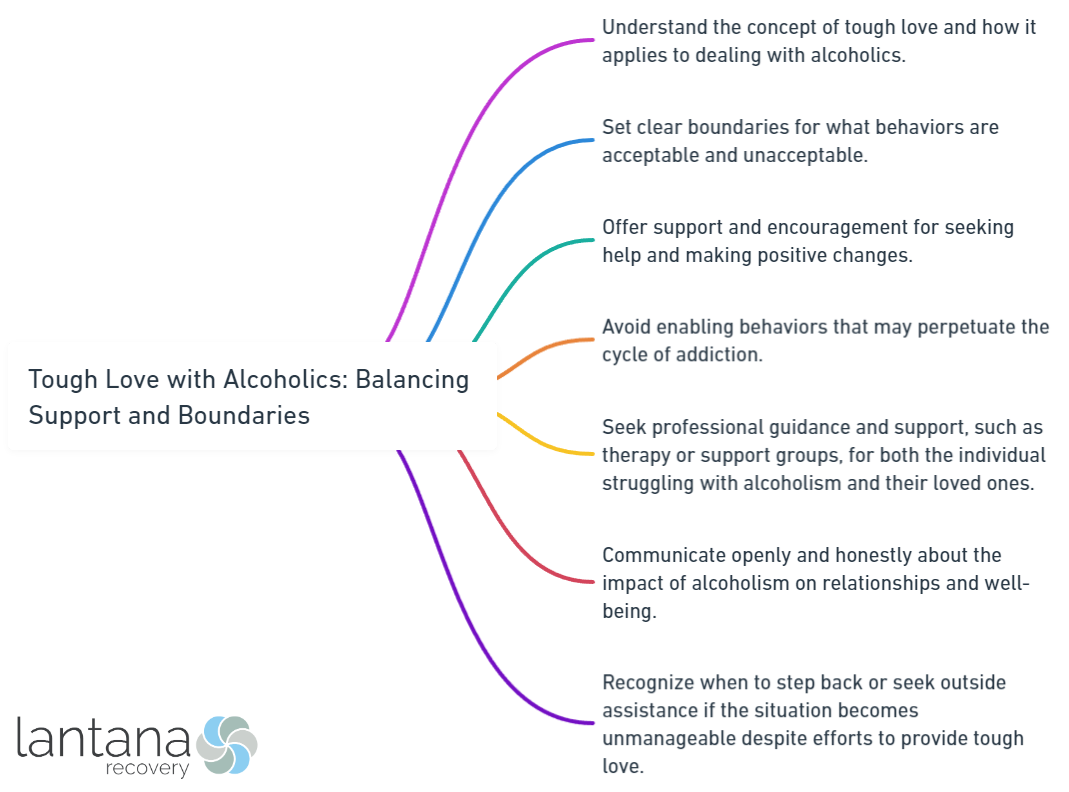Addiction, particularly alcoholism, can be a challenging issue to address, especially when it involves a loved one. Tough love is a concept that is often mentioned in relation to dealing with alcoholics. It is crucial to strike a delicate balance between providing support and setting boundaries to help them on the path to recovery. Understanding the concept of tough love and its application in the context of alcoholism is essential for both the individual struggling with addiction and their loved ones. This article will explore the concept of tough love, the importance of support and boundaries, strategies for implementing tough love, and coping mechanisms for loved ones. By navigating this challenging terrain with empathy and understanding, you can offer the necessary support while maintaining healthy boundaries to promote healing and recovery.
Understanding Tough Love
Understanding Tough Love is essential when dealing with individuals struggling with addiction. Employ active intervention strategies to motivate behavior change. Establish clear boundaries and expectations to provide support.
1. Acknowledge severity: Recognize the seriousness of addiction and its impact on the person’s life. Implement appropriate interventions.
2. Set boundaries: Establish clear boundaries to help individuals with addiction. Define acceptable behavior to maintain a safe and supportive environment.
3. Detach with love: Practice tough love by emotionally detaching from the person’s addiction while showing love and support. Let them face the consequences with a support system.
4. Encourage accountability: Hold individuals accountable for their actions. Empower them to take control of their lives and make positive changes.
5. Provide resources: Offer therapy, support groups, or treatment programs to individuals struggling with addiction. Give them the tools necessary to overcome their addiction.
Understanding tough love involves a compassionate yet firm approach to helping individuals with addiction. Balance support and boundaries to promote positive change and facilitate recovery.
What is Tough Love?
Tough love involves setting clear boundaries and providing emotional support to someone struggling with destructive behaviors or addiction. It prioritizes long-term well-being over short-term comfort or enabling. Understanding tough love:
1. It involves setting clear boundaries: Establish and communicate expectations and consequences for behavior. Boundaries maintain a healthy relationship and encourage accountability.
2. It requires providing emotional support: Tough love involves tough decisions and actions but doesn’t mean abandoning someone emotionally. Being there, listening, and expressing empathy are crucial in their recovery.
3. It aims to promote personal responsibility: It encourages ownership of actions and positive changes. Tough love prompts self-reflection and growth by letting someone face the consequences.
4. It often involves detaching with love: This means stepping back and allowing natural consequences. Detaching with love shows care for well-being but not enabling destructive behavior.
Sarah’s son, John, struggled with alcohol addiction. After enabling him, Sarah realized tough love was necessary. She set boundaries and stopped providing financial support. Her tough love motivated John to seek help and take responsibility. He completed a rehabilitation program and turned his life around. Sarah’s tough love had a significant impact.”

Dealing with Alcoholics
Dealing with alcoholics can be challenging, but finding the right balance between support and boundaries is crucial. In this section, we’ll explore the keys to effectively navigating this delicate situation. From recognizing the problem to understanding the essential roles of support and boundaries, we’ll uncover strategies that can make a real difference in the lives of both the alcoholics and their loved ones. Let’s dive in and discover the path to tough love and meaningful change.
Recognizing the Problem
Recognizing the Problem is crucial for effective support and intervention in cases of alcoholism. Active listening and observation skills are key in identifying signs and symptoms of addiction. Here are some guidelines to help identify alcoholism:
1. Observe behavior changes: Look for signs such as increased secrecy, withdrawal from social activities, and neglect of responsibilities. These changes could indicate alcohol abuse.
2. Notice physical signs: Recognize symptoms like bloodshot eyes, tremors, and unexplained injuries or accidents that may indicate alcohol abuse.
3. Evaluate emotional and psychological changes: Watch for mood swings, irritability, depression, and increased aggression, as these can be indicators of addiction.
4. Observe drinking patterns: Take note of frequent and excessive alcohol consumption, including drinking alone or using alcohol to cope with stress or emotions.
5. Assess impact on relationships: Consider the strain alcoholism may place on personal and professional relationships, including arguments, neglect, or conflicts resulting from alcohol use.
6. Look for signs of denial: Individuals struggling with alcohol addiction often deny or minimize their behavior. Consistent denial or defensiveness when confronted may indicate they are in denial.
By recognizing the problem, you can support the individual and encourage them to seek professional help. Approach the issue with empathy and understanding, as alcoholism is a complex disease that requires comprehensive treatment.
Understanding the Role of Support and Boundaries
Understanding the role of support and boundaries is extremely important when dealing with loved ones who are struggling with alcoholism. Support is absolutely crucial in helping alcoholics along their journey towards recovery. Emotional support is vital because it reassures them that they are not alone and that their loved ones are there for them, ultimately boosting their overall well-being.
On the other hand, setting clear boundaries is equally essential as it serves to protect both the alcoholic and their loved ones, ultimately enhancing the well-being of everyone involved and prioritizing their emotional and physical safety. It’s imperative to learn how to say no when necessary, as this helps to cultivate proficiency in maintaining healthy boundaries.
Additionally, it’s important to note that tough love is not about punishing or abandoning the alcoholic, but rather providing necessary support while holding them accountable for their actions. Seeking professional help, such as therapy or counseling, is highly recommended to receive tailored guidance, access valuable resources, and employ effective strategies.
By fully comprehending and embracing the role of support and boundaries, both the alcoholic and their loved ones can embark on a journey towards healing and recovery.

The Balancing Act: Support and Boundaries
Navigating the delicate dance between support and boundaries is a crucial aspect when dealing with alcoholics. In this section, we’ll explore various strategies to strike the right balance in providing emotional support and setting clear boundaries. Additionally, we’ll tackle the art of learning to say “no,” a skill that is often essential in maintaining a healthy relationship with individuals struggling with alcohol addiction. So, fasten your seatbelts as we embark on this journey of tough love and finding harmony in challenging circumstances.
Providing Emotional Support
Providing emotional support is crucial when dealing with a loved one struggling with alcoholism. As they navigate this challenging time, it is important to be there for them and offer the necessary support. Show empathy by letting your loved one know that you understand and acknowledge their emotions. Validate their feelings and assure them that they are not alone in this battle.
Additionally, actively listen to your loved one and create a safe space for them to express their fears, worries, and frustrations. Avoid passing judgment or criticism and instead offer a compassionate ear. Your role should be that of a good listener who provides comfort and understanding.
Offer encouragement to your loved one by motivating them and reminding them that recovery is indeed possible. Let them know that you believe in their strength and ability to overcome addiction. By expressing your faith in them, you can provide the inspiration they need.
Patience is key during the recovery process as it takes time. Recognize that progress may be slow and consistently offer your support. Be understanding of setbacks and maintain a patient attitude throughout.
Reassure your loved one of your continuous support and commitment to their well-being. Make sure they are aware that you are there to help them through every step of the recovery process. Reiterate your dedication to their journey towards a healthier life.
Remember that providing emotional support is not a one-size-fits-all approach. Each person’s needs may differ, so adapt your support accordingly. Stay attentive, be attuned to their emotions, and make yourself available whenever they need someone to lean on.
tags intact, if found.
Setting Clear Boundaries
Setting clear boundaries is of utmost importance when dealing with alcoholics, using tough love. It is essential not only for your own well-being but also for encouraging your loved ones to take responsibility. To effectively set clear boundaries, follow these steps:
1. Take time to reflect on your own needs and limits. Understand what kind of behavior you are willing to tolerate from the alcoholic and what you are not.
2. Communicate your boundaries clearly to the alcoholic. Use assertive and respectful language to express your expectations.
3. Stay consistent in enforcing your boundaries. If the alcoholic violates the boundaries, make sure to follow through with appropriate consequences.
4. Seek support from others who understand your situation. Connect with a support group or therapist who can provide guidance and validation.
To illustrate the significance of clear boundaries, let’s take a look at Sarah’s experience with her alcoholic father. Sarah used to enable her father’s destructive behavior by acting as his caretaker. However, after attending therapy sessions, she realized the importance of setting clear boundaries. Sarah bravely communicated her boundaries to her father, informing him that she would no longer provide financial support or enable his alcoholism. Initially, her father resisted, but Sarah’s unwavering commitment eventually motivated him to seek help for his addiction.
Learning to Say No
Learning to say no is crucial when dealing with alcoholics and implementing tough love. It can be challenging to set boundaries and refuse requests, but it is important for the well-being of the individual struggling with alcohol addiction and for your own mental and emotional health.
Saying no requires assertiveness and clear communication of boundaries. Remember that learning to say no does not mean abandoning or rejecting the person; it is a way of showing tough love and encouraging them to take responsibility for their actions.
When learning to say no, be firm but kind. Avoid making excuses or justifications. Use assertive language and say things like “I cannot lend you money” or “I am unable to attend this event with you.”
Learning to say no can be difficult when faced with emotional manipulation, but setting clear boundaries and saying no when necessary is essential for supporting the individual struggling with alcohol addiction.

Implementing Tough Love
Finding the delicate balance between support and boundaries is crucial when dealing with alcoholics. In this section, we will explore the implementation of tough love, examining the contrast between tough love and enabling. We will also discuss the importance of seeking professional help and the concept of detaching with love, all vital components in navigating this challenging journey. So, get ready to learn how to effectively implement tough love and create a conducive environment for recovery.
Tough Love vs Enabling
Understanding the difference between tough love and enabling is crucial when dealing with alcoholics. Here are the main points to consider:
1. Tough Love: It is a form of discipline and support that helps alcoholics confront the consequences of their actions and make positive changes. It involves setting clear boundaries and holding the person accountable.
2. Enabling: This behavior inadvertently supports the alcoholic’s addiction by sheltering them from the negative consequences of their actions. It often includes making excuses, covering up mistakes, or providing financial or emotional support without expecting change.
3. Tough Love is effective: It helps break the addiction cycle by forcing the alcoholic to face the outcomes of their behavior. It can motivate them to seek help and take responsibility.
4. Enabling perpetuates the addiction: Enabling behavior protects the alcoholic from the consequences of their addiction, allowing them to continue their destructive habits without seeking change.
5. The Importance of Professional Help: While tough love can be effective, seeking professional guidance is essential when dealing with addiction. Professionals can provide strategies and support for both the alcoholic and their loved ones during recovery.
In a true story, John’s family had been enabling his alcohol addiction for years. They constantly made excuses for his behavior, provided him with money, and cleaned up his messes. However, after learning about tough love and the importance of boundaries, they changed their approach. They stopped making excuses and set clear boundaries. They refused to give him money unless he sought treatment and held him accountable. It was tough at first, but John eventually realized the need for change and sought help. Today, John is in recovery, and his family continues to provide support while maintaining healthy boundaries.
Seeking Professional Help
When it comes to dealing with tough love and alcoholics, seeking professional help is of utmost importance. Accessing the expertise of trained professionals who specialize in addiction treatment can provide valuable guidance and support for both the individual struggling with alcohol addiction and their loved ones.
Professional help allows you to tap into the knowledge and experience of experts who can accurately assess the situation and recommend suitable treatment options. They can assist in creating a personalized treatment plan tailored to the specific needs of the individual, which may include detoxification, counseling, therapy, and support groups.
Dealing with an alcoholic loved one can have a significant emotional impact. By seeking professional help, you can receive emotional support from therapists and counselors who are trained to navigate the challenges of tough love and addiction. They can also provide valuable education about addiction, relapse prevention, and coping strategies. Additionally, professionals can connect you with additional resources such as support groups and community services.
One of the benefits of seeking professional help is gaining an objective perspective on the situation. Professionals offer an unbiased viewpoint that can help you gain clarity and make informed decisions. They can provide advice on establishing healthy boundaries and expectations.
It is important to remember that seeking professional help is not a sign of weakness. On the contrary, it is a proactive step towards addressing and managing the complex dynamics involved in tough love with alcoholics.
Detaching with Love
Detaching with love is a crucial aspect of employing tough love with alcoholics. It is important to establish emotional distance while still demonstrating care for individuals struggling with alcohol addiction. Below are essential points to consider when detaching with love:
-
Recognize your limitations: It is vital to understand that you cannot control or remedy the alcoholic’s behavior. Their recovery is their own responsibility, and you cannot coerce them into changing.
-
Stop enabling behaviors: Detaching with love entails no longer supporting the alcoholic’s addiction. This includes refraining from providing them with money, covering up their mistakes, or making excuses for their actions.
-
Set healthy boundaries: Establishing clear boundaries is essential to safeguard your emotional and physical well-being. This may involve limiting your time spent with the alcoholic or refusing to engage in arguments.
-
Prioritize self-care: Ensure your own well-being by implementing stress-reducing techniques, seeking support from friends and family, or attending counseling or support groups.
-
Offer support from a distance: Detaching with love does not mean completely cutting off all contact. You can still demonstrate love and support while maintaining boundaries. Encourage them to seek professional help or provide information about treatment options.
Remember, detaching with love can be challenging. Seek support for yourself and concentrate on your own well-being. By setting healthy boundaries, you create an environment where the alcoholic can take responsibility and seek help when they are ready.

Coping Strategies for Loved Ones
When dealing with the challenges of supporting loved ones struggling with alcoholism, it’s crucial to have effective coping strategies in place. In this section, we’ll explore practical ways to maintain our own well-being while still offering the necessary support. From practicing self-care and setting healthy boundaries, to building a reliable support network and seeking professional therapy, we’ll discover valuable tools for navigating this difficult journey. Let’s dive in and explore these essential coping strategies together.
Self-Care and Establishing Boundaries
Self-care and establishing boundaries are crucial when supporting a loved one with alcoholism. Taking care of yourself ensures you have the strength to effectively support them. Here are some key steps to incorporate self-care and establish boundaries:
-
Prioritize your well-being: Engage in activities that promote your mental, emotional, and physical health. Practice self-care by exercising regularly, getting enough sleep, eating nutritious meals, and participating in enjoyable hobbies or activities.
-
Set clear boundaries: Clearly communicate your expectations and limits. Let your loved one know what behaviors you will tolerate and what actions are not acceptable. Stick to these boundaries consistently to establish healthy boundaries.
-
Practice self-compassion: Understand that you can’t control their actions or choices. Be kind to yourself and avoid blame or guilt. Remember that you can’t fix their problems; they need to take responsibility for their own recovery.
-
Seek support from others: Reach out to friends, family, or support groups for empathy, guidance, and understanding. Connecting with people who have similar experiences can provide valuable insight and a sense of community, aiding in your self-care journey.
-
Take breaks when needed: It’s important to step back and engage in activities that bring peace and relaxation. Give yourself permission to take breaks from the stress of supporting a loved one with addiction. By incorporating self-care and establishing boundaries, you can maintain your well-being while providing support to your loved one. Remember, you can’t control their recovery, but you can control how you care for yourself in the process.
Building a Support Network
Building a strong support network is crucial when dealing with tough love and alcoholics. Here are some steps to follow:
1. Surround yourself with trustworthy individuals who can provide understanding and support, such as family members, friends, counselors, and support groups.
2. Open Communication: Share your struggles openly with your support network. By doing so, you will feel supported and understood.
3. Seeking Professional Help: It is advisable to involve therapists and addiction specialists in addition to your support network. They can provide guidance and help navigate tough situations.
4. Attending Support Groups: Joining specific support groups for individuals dealing with alcoholics can be highly beneficial. These groups offer a safe space to share stories, gain insights, and find solace in knowing others are going through similar experiences.
5. Prioritizing Self-Care: While supporting an alcoholic, it is important to take care of your own physical and emotional well-being. Engaging in activities such as exercise, meditation, and hobbies that bring you joy and relaxation is essential.
6. Setting Boundaries: Clearly define and communicate your limits to the alcoholic and your support network. Boundaries are necessary for maintaining your well-being and preventing the enabling of destructive behaviors.
By building a strong support network, you will have the guidance, understanding, and encouragement needed throughout the challenging journey of tough love with alcoholics. Remember to lean on your support system when needed and maintain open communication for a healthy environment for everyone involved.
Seeking Therapy and Counseling
Seeking therapy and counseling can help when dealing with a loved one’s alcoholism. Therapy provides a safe environment to address emotions and learn coping strategies. Therapy sessions help people understand their relationship dynamics and how it affects their mental health. Loved ones can explore their needs, boundaries, and communication skills to maintain their well-being while supporting the alcoholic. Counseling helps develop healthier coping mechanisms for stress and anxiety. Therapists guide in self-care, setting boundaries, and creating a support network. Joint sessions with the alcoholic can address relationship challenges and promote healing. Seeking therapy is not a sign of weakness, but a proactive step towards self-improvement and managing the complexity of loving someone with alcohol addiction.
Frequently Asked Questions
FAQ 1: How can I balance supporting an alcoholic while also setting boundaries?
The key to balancing support and boundaries with an alcoholic is to establish a clear plan and stick to it. It’s important to offer your support and encouragement for their recovery, but also set firm boundaries to protect your own well-being. By setting expectations and consequences for negative behaviors, you can maintain a positive and healthy relationship while encouraging their sobriety.
FAQ 2: What are some positive actions I can encourage from my loved one who is in recovery?
Encouraging positive behavior is essential in supporting the recovery journey. Some positive actions you can encourage include attending support group meetings, participating in therapy or counseling sessions, engaging in healthy hobbies or activities, and practicing self-care. By focusing on these positive actions, you can provide support while reinforcing a sober lifestyle.
FAQ 3: How can I manage my own emotions and uncertainties during the ups and downs of their recovery?
During the stages of recovery, you may experience a range of emotions and uncertainties. It’s important to prioritize self-care and seek support from friends, family, or a therapist. Practice effective communication, express your concerns openly, and maintain a hopeful attitude. Remember that recovery is a multi-layered approach, and there may be setbacks along the way. By focusing on your own well-being and staying connected to a support network, you can navigate the uncertain time with resilience.
FAQ 4: What resources does SAMHSA’s National Helpline provide for families supporting individuals with substance use disorders?
SAMHSA’s National Helpline offers a range of resources for families supporting individuals with substance use disorders. They provide a booklet on substance abuse treatment for families, a resource for teens with parents who abuse alcohol or drugs, a guide for family members after a relative’s suicide attempt, and information on the role of family therapy in recovery from mental illness or addiction. These resources can provide valuable information and guidance in supporting your loved one’s recovery.
FAQ 5: Can SAMHSA’s National Helpline help me find treatment options if I don’t have health insurance or have limited financial resources?
Yes, SAMHSA’s National Helpline can assist individuals with no insurance or those who are underinsured by referring them to state-funded treatment programs or facilities that offer sliding fee scales or accept Medicare or Medicaid. By providing your zip code, you can access local resources that fit your financial situation. The helpline is dedicated to connecting individuals and families with the appropriate treatment options regardless of their financial circumstances.
FAQ 6: What is the importance of aftercare programs in maintaining long-term success in recovery?
Aftercare programs play a crucial role in sustaining long-term success in recovery. These programs provide ongoing support and resources to individuals after completing inpatient or residential treatment. They often include relapse prevention strategies, counseling, support groups, and assistance with transitioning back into daily life. By participating in aftercare programs, individuals can maintain their sobriety, address any challenges that arise, and receive continued support on their journey towards lasting recovery.










